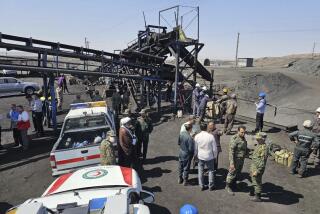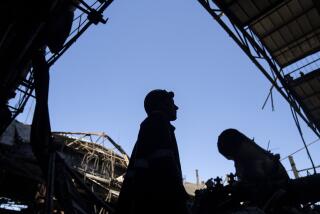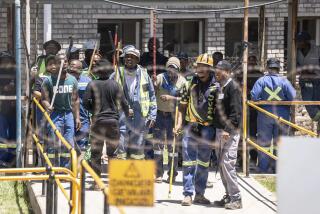Soviet Workers Split Over Crippling Miners’ Strike : Protest: The spreading coal walkout for economic and political goals threatens industrial jobs and the sick economy.
- Share via
MARIUPOL, Soviet Union — Pitting steelworkers against miners, the 16-day-old coal strike in the industrial heartland of the Ukraine is splitting the Soviet working class in ways that Karl Marx never envisioned.
In this grimy industrial town on the Azov Sea, the mere mention of the coal miners’ strike elicits bitter reactions from workers at the Ilyich Iron and Steel Works, which is threatened with closure by the lack of coal.
“It’s wrong to strike now because the country is in such bad shape,” Yevgeny N. Vasin, 54, a welder, said as he made his way to work the afternoon shift at one of the Soviet Union’s largest steel mills. “The more they strike, the worse our lives will become.
“If they don’t give us coal, then the cycle is broken. We depend on this coal--everyone knows this, from the simplest worker to the director of the factory.”
As the coal strike began its third week and more mines across the country join the strike each day, top officials as well as rank-and-file workers in the country’s industries that rely on coal anxiously called for an end to the work stoppage.
“To put it plainly: The working class is against the strike,” Vladimir Rodenko, 59, a metalworker, declared. “We all have the same complaints, but the miners are the only ones who stop working. The rest of us just keep on toiling. But they want to take money from our pockets and food out of our mouths.”
By Saturday, the number of mines on strike nationwide had grown from about 100 two days earlier to more than 150, including 45 mines in the Ukraine’s Donetsk Coal Basin, according to the strike committee in Donetsk, the heart of the country’s largest coal region. Across the country, hundreds of thousands of miners are believed to be striking now, but coordinators of the protest have not yet totaled the number.
The miners have both political and economic demands, which vary from mine to mine; some are calling for Soviet President Mikhail S. Gorbachev’s resignation, others want wage increases of 100% to 150%.
In Krasnoarmeysk, where some of the Donetsk Basin’s largest mines have not been worked since the first day of the strike, railroad workers demanded 518,000 rubles, about $932,400 at the official exchange rate, in compensation for their losses from the miners.
“The miners’ strike, for all intents and purposes, has left us all unemployed,” V. Podlipanov, chairman of the work collective at the locomotive depot in Krasnoarmeysk, said at a meeting last week, Tass reported.
But the miners have rejected appeal after appeal.
“We will strike until all our demands are met,” Pavel V. Sukhopora, 36, a miner from the Oktyabrskaya Mine in Donetsk, said. “Other working people think we’re trying to take something away from them because all the information in the press and on television is against us.
“But we’re trying to change the system. Until it has changed--as long as the Communist Party rules us--working people will never live better.”
Many miners stressed that their political demands, aimed at eliminating the strong central government and promoting a market economy, take priority over their desire for a better life for themselves.
“The railroad workers say we’re at fault for their problems,” Yuri A. Moiseyenko, 41, another Oktyabrskaya miner, explained. “They think our strike is about getting more sausage and other scarce items for ourselves. They don’t understand that we’re striking for everyone.”
Top officials at nearby steel factories have put pressure on the miners to go back to work in meetings with them, in speeches against the strike on television and in statements condemning the work stoppage.
“We are categorically against the strike,” Pavel K. Razumny, deputy director of the Ilyich plant, said in an interview. “They should not be allowed to stop the mines because it affects the rest of the metal industry.
“We are afraid. What if there’s no coal tomorrow? We will have to close down. This is very serious. Why should we suffer because of them?”
In the first two weeks of the strike, the financial losses in the coal industry amounted to 140 million rubles, or about $252 million at the official exchange rate, state television reported Saturday.
But the overall loss to the economy was probably 10 times that because of the shortfall in steel and other products for which coal is needed, according to “Vremya,” the nightly television news program.
Losses from the strike could multiply quickly and far exceed those of the even larger, two-week strike in July, 1989, if miners do not go back to work soon, Razumny said. More than 500,000 miners across the country participated in that protest for higher pay and better living conditions.
“If the strike goes on, it could bring our production to a halt,” Razumny said. “That would mean tens of thousands of people, just at this plant, would be without work and without pay.”
Electric power plants are also feeling the effects of the strike. Over the past two days, coal deliveries were 21,000 tons less than needed at power plants in the western Siberian Kuznets Basin, where 42 mines are on strike, Tass reported.
If the strike continues, power plants will be forced to decrease the electricity supplied to mines and other industries. “Power engineering workers stated today that they will take no responsibility for consequences of the reduction of fuel supplies,” Tass said.
Miners have been threatened with lawsuits, fines and other sanctions by government and industry officials.
“We did not feel such pressure from officials last time because everyone was in shock,” Sergei A. Famin, 31, a coal miner from Krasnoarmeysk, said. “But now they have a new confidence. Since the events in Lithuania (when troops opened fire on nationalist demonstrators, killing 19 civilians), they know they will be backed up by the army, the KGB and the prosecutor.”
More to Read
Sign up for Essential California
The most important California stories and recommendations in your inbox every morning.
You may occasionally receive promotional content from the Los Angeles Times.












